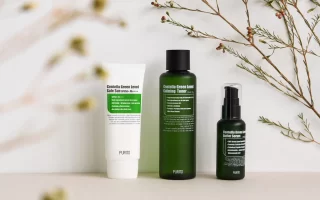Dressing for the cold and getting out of bed on dark mornings aren’t the only things you have to worry about this season. Tight skin, dry patches and chapped lips may have already started affecting you too, which means winter is here and ready to wreak havoc on your skin.
Your skin’s needs are going to change as we get deeper into winter, but thankfully, it’s not too difficult to keep your complexion happy with some key adjustments to your skincare routine. Here’s what you need to know to winter-proof your skin and maintain a glowing visage until spring rolls around.
Table of Contents
How Does Winter Affect Your Skin?
Several weather-dependent skin issues tend to come up during winter, with dryness being the most common. As temperatures drop, humidity levels in the air decrease, effectively sucking moisture from your skin. Your skin may also become more inflamed or sensitive in cold and windy weather, so that’s something else to look out for. Combat these typical winter skin problems by showing your skin some extra care this season.
Top Tips for Winter Skincare
A Rich Moisturiser Is Essential
A good moisturiser can help to keep the skin hydrated by forming a barrier on the skin’s surface to lock in moisture. Moisturisers often contain humectants (e.g., glycerin and hyaluronic acid), emollients (e.g., shea butter), occlusives (e.g., rose hip), or ceramides.
Gel moisturisers are ideal in summer when you want to keep your skincare products as lightweight as possible, but as winter approaches, they’re probably not going to cut it. Swap your light moisturiser for a richer cream to combat any dryness.
It’s also essential to look for moisturisers specially formulated for the face and are noncomedogenic, meaning they don’t clog pores, especially if you have oily or acne-prone skin.
Invest in a Humidifier
Dry winter air prevails indoors and outside, but this is where you have greater control over your environment. Using a humidifier in your home or office will add moisture to the air, helping to keep your skin hydrated.
Investing in a humidifier during the winter months can be a great way to improve your skin’s overall health and appearance. This is because the dry, heated air in most homes and buildings during the winter can cause the skin to become dry and irritated, leading to itching, flaking, and redness.
There are several different types, such as cool mist, warm mist, and ultrasonic humidifiers. Cool mist humidifiers use a fan to disperse a cool mist of water into the air, while warm mist humidifiers use heat to create a warm mist. Ultrasonic humidifiers use high-frequency vibrations to turn water into a fine mist. Choosing the right one will depend on your specific needs and preferences.
Take the Temperature down a Notch
The air inside your home may be dry because you’ve got the heating on too much. Central heating may keep you warm, but it also reduces the amount of moisture in the air, which your skin will feel the effects of. It’s winter, so we don’t expect you to turn the heating off completely, but if you could turn it down a notch or layer up with knitwear for part of the day instead, your skin will thank you.
Stay Hydrated
As well as treating your skin to a thicker moisturiser, you can also keep it hydrated from the inside. Make sure you drink plenty of water and eat foods or supplements that contain omega-3 or omega-6 fatty acids. In addition, you can also take IV hydration therapy, which provides all the necessary nutrients directly to your bloodstream and boosts hydration levels.
Consider Professional Skin Treatments
Winter is an excellent time of year for skin treatments, as they can provide an extra boost of moisture and plumpness at a time when your skin may otherwise feel dull and dehydrated. Consider a trip to a reputable Harley Street clinic for a course of skin hydration therapy, which uses hyaluronic acid to rejuvenate your skin for a smooth, soft and glowing look.
Limit Long Showers
That long morning shower you love so much? Not great for your skin. At a time when your skin already has to combat dry winter air and cold conditions, exposing it to all that hot water can strip it of moisture even further. Try turning the temperature down a little to limit any damage.
Layer up on Skincare Products
If you’re struggling with dry skin in winter, layering skincare products is key. It’s essential to apply your products in a particular order, though — make sure your moisturiser and serums go on first and follow with a facial oil to lock in moisture.
If you have skin conditions like rosacea, you can mix your moisturiser with a vitamin A serum. A vitamin A serum benefits skin suffering from flare-ups, especially during winter.
You Still Need SPF
It may not feel like the sun is much of a threat right now, but you still need to apply sun protection factor (SPF) daily, even in winter. Ultraviolet rays can damage your skin in any weather, so remember to keep stocked up on SPF and continue to apply it at the end of your skincare routine.




